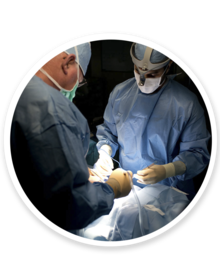General Surgery
 Previty offers a wide variety of minimally invasive surgical procedures depending on your needs.
Previty offers a wide variety of minimally invasive surgical procedures depending on your needs.
PROCEDURES
Surgeons at Previty perform Minimally Invasive Surgeries for many problems including:
- Complex Hernias (Endoscopic Release of Components)
- Gallbladder Disease
- Small Bowel Disorders
- Emergency Surgery
TYPES OF MINIMALLY INVASIVE PROCEDURES OFFERED AT PREVITY
- 3-D High Definition Laparoscopic Surgery–Dr. Peel performed the first ever 3D HD Laparoscopic Ventral Hernia and Laparoscopic Appendectomy, and the second ever Laparoscopic Cholecystectomy
- Single-Incision Surgery
- Staged Colon and Rectal Cancer Surgery
- Inflammatory Bowel Disease Surgery
- Laparoscopic Surgery for complex hernias








